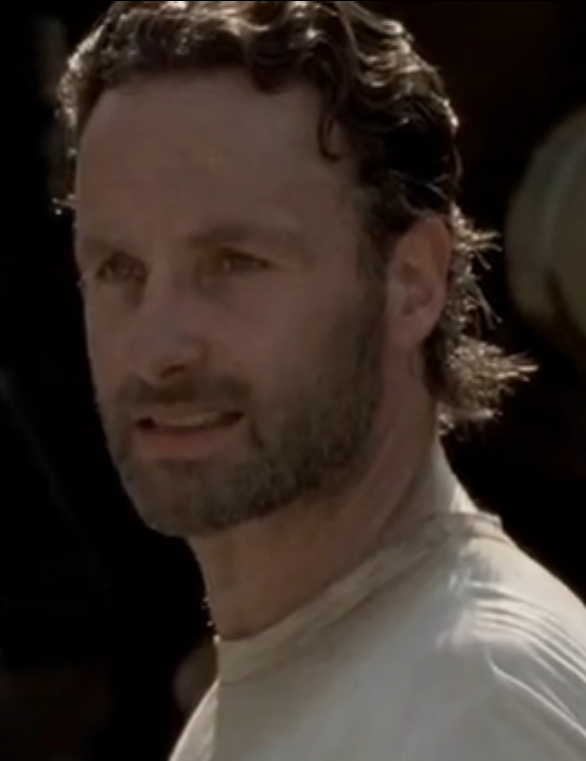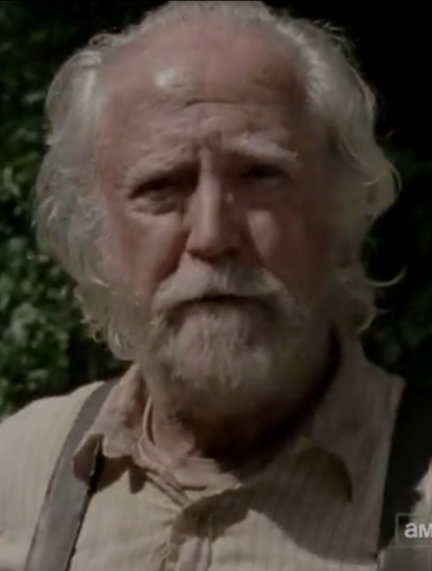The Walking Dead is a show revolving around a group of survivors during the zombie apocalypse. One of the show's main protagonists is Rick. What I find fascinating about him is how he becomes the natural leader of the group in season 1. The type of agency that Miller discusses comes into play. Miller writes, "Our attributions of agency produce the kinetic energy of performance and thereby engage the performance as action," (152). Rick's agency feels like potential even from episode one. The viewer finds that he is a police officer and whats more, was a sheriff before the world fell prey to the zombies. One could argue that his background, coupled with the situation, allowed Rick to harness to the kinetic energy of agency to become the leader of the group. Not only did he harness it, but others deferred to him. Everyone made a series of choices, exercising their agency, and thus, allowed Rick to come out as leader.
Rick's leadership style in the beginning can be described as democratic. Again, I think he draws on this potential/kinetic agency from the group to try and make decisions that will be best for everyone. However, this does not always work in life or death situations. Miller's view discounts the shift the audience sees in Rick at the end of season 2 and at the beginning of season 3.
When you're life is on the line, democracy goes out the window. For Rick, his sense of agency is no longer draw from the group. As Cooper writes, "Individual agency is necessary fo the possibility of rhetoric," (426). In the speech Rick gives, he draw his agency from within in order to declare his "Ricktatorship." He makes clear that he will be the one calling the shots and does not need input from others in the group. Cooper discusses how President Obama's agency and sense of rhetorical purpose has been constructed over a series of events in his life. The same can be said for Rick. Events in season 1 and 2 lead up to his decision to approach being a leader in a new light. "The process of assimilation defines an agent as an individual with his or her own intensions and goals; individual agents are determinate, but not determined, in an ongoing becoming driven by the interactions among the components of their nervous system and by their interaction with the surround," (Cooper 428).
One can argue that the decisions made by Rick, while a result of some agency, is also directly in response to the new surroundings he's faced with. Zombies can attack at any moment. The survivors struggle for food, basic shelter, and peace of mind. So, Rick's agency doesn't just come from within, or from the group. He also has to contend with the landscape. Part of that agency is deciding to kill zombies.
However, that isn't the only choice. In season 2 we see Hershel, a retired veterinarian who decides to capture and keep the zombies alive in his barn with the hopes that a cure will be found someday. His sense of moral agency is in direct opposition to Rick and the group. They've been compelled by a different set of circumstances to kill and move on, while Hershel has the protection of his secluded farm . Part of his agency is driven by emotions. His wife was infected and his attachment to her is part of what the reason he rounds up zombies instead of killing them. "Emotions are at base, preparations for action, and we become aware of them only when they are expressed publicly observable, and internally felt, adaptations of the body that serve as signals of intent," (Cooper 430). Another contentious character Shane, ends up forcing Hershel's hand. He exposes his sentimental emotions for weakness by unleashing "the walkers" from the barn. As result, the group is forced to kill or be killed. Later on, we see a distinct shift in Hershel's agency. He adopts the view that these zombies are no longer people and must be killed in order to save the lives of himself and the group.
In this show, agency and choice live side by side. It reveals how complex agency can be.


Kiera, we both connected rhetorical agency to The Walking Dead! I didn't see yours before I wrote mine, so I'm glad we went different directions in our analyses of the show in relation to agency.
ReplyDeleteI just saw yours. I like how you deal with the post humanistic agency and the seance analogy with Rick. That connection wasn't readily apparent to me, but it helped in my understanding. Also, how good is The Walking Dead right now?
ReplyDelete